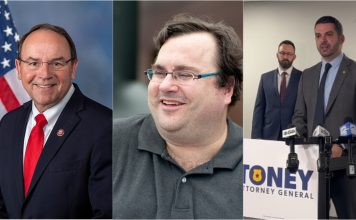People around the Capitol only half-jokingly refer to Maggie Gau as “Gov. Maggie” due to her powerful influence with Gov. Tony Evers.
Wisconsin Gov. Tony Evers must remove his chief of staff Maggie Gau. If he doesn’t, he is putting Gau’s subordinate, other office workers, and state taxpayers in a terrible position.
He also needs to develop a clear workplace policy banning/regulating supervisors from dating their subordinates. The haphazard way that Evers and Gau have handled this situation is completely unacceptable, utterly non-transparent, and simply wrong.
In case you missed it, the Milwaukee Journal Sentinel reported that Democratic sources believe it is likely that Gau is in “a longtime romantic relationship with another senior employee whom she directly supervises” in the governor’s office. Both are public employees in prominent positions.
According to the Journal Sentinel’s Dan Bice, Evers “acknowledged that his office doesn’t restrict supervisors from engaging in consensual romantic relationships with the staffers they oversee.” He then snapped, “I don’t think it’s anybody’s goddamn business.” What an appalling response.
We have filed an open records request for the subordinate’s performance evaluations, the name of the person who conducted them and emails or texts between Gau and the subordinate using state devices or accounts.
This indefensible position makes the Democratic governor look very hypocritical, but it also exposes taxpayers to the dangers of a future potential sexual harassment or workplace claim. During the governor’s race, Evers tried to capitalize on sexual harassment claims against his Republican opponent’s large company, releasing a critical ad, and allowing his campaign manager Cassi Fenilli to say: “Culture starts at the top, which is why these allegations of harassment and discrimination at the Michels Corporation are extremely disturbing.”
That’s right, governor. Culture starts at the top. In fact, Evers issued an executive order on non-discrimination demanding that all state agencies “shall take steps necessary to prevent and stop discrimination, sexual harassment, or harassment.” He urged an emphasis on “harassment prevention” and fairness in the workplace.

Evers also issued an executive order demanding sexual harassment and accountability protocol in the Wisconsin National Guard.
In 2020, Evers also authorized Attorney General Josh Kaul to file a complaint opposing federal efforts to weak “protections for sexual assault and harassment victims.” This smacks of the old phrase, for thee, but not for me. In this post “me-too” era, the Democratic governor should know better.
According to the Journal Sentinel story, the subordinate was making $62,000 in a deputy position in 2019 that did not report directly to Gau but “was still under her chain of command.” Evers appointed the subordinate to a “top-level position” reporting to Gau in November 2020 with a salary of $100,006, and the pay rose to $112,008 per year in January, meaning the staffer received an “80% pay increase in four years,” according to Bice.
To be clear, we don’t care whom Maggie Gau dates, nor would it generally be any of our business and by all accounts, the relationship appears consensual and free of sexual harassment allegations (such as those that derailed former Milwaukee Mayor John Norquist). What Maggie Gau does as the governor’s chief of staff, though, is all of Wisconsin’s business. Bice wrote that “employment attorneys said managers should be strongly discouraged from having a relationship with a subordinate because of the potential for sexual harassment claims or discrimination complaints.”
This concern is exacerbated by the powerful nature of Gau’s position. As Tony Evers’ chief of staff, Gau is so powerful that she is commonly called the “real governor” or “Gov. Maggie” by people around the Capitol. When we went to the Capitol with the family members of murder victim Johanna Balsewicz, who were seeking a meeting with Evers on a looming parole, it was Gau who initially spoke with them inside Evers’ warren of offices, for example.
A 2019 article in the Capital Times described Gau’s incredible influence with Evers, whose campaign she ran. It also describes the tight-knit nature of the office staff and meetings.
For some reason, the Journal Sentinel’s Dan Bice censored the title and name of the subordinate employee, but the talk show host Mark Belling identified the subordinate as Britt Cudaback, Evers’ communications director. Public records obtained by Wisconsin Right Now show Cudaback and Gau with the same address.
[UPDATE: Read Cudaback’s epic email to Bice, which we obtained through an open records request. It shows that the subordinate in this situation was shielding Gau from the news media.]
Maggie Gau & Tony Evers: Lack of Transparency
Gau has not been transparent on the matter. This is not acceptable. “Maggie Gau, Evers’ longtime chief of staff and top aide, is not answering my questions about the nature of her relationship with Britt Cudaback, the governor’s communications director. Cudaback, who is Evers’ lead spokesperson, is also not responding to my inquiries,” Belling wrote.
What a mess!
Bice wrote that a 1,300-word statement provided to him by Evers’ office “skirted the issue of whether the pair of Evers’ employees are dating” and, when asked directly, Gau told him to refer to that statement, which didn’t answer the question.
Governor, it is everyone’s business when a powerful chief of staff is allegedly dating a subordinate. We think you’re taking this stance because Gau is an employee you feel you can’t afford to lose.
However, the situation is simply untenable. Evers can not allow it to remain without putting taxpayers and others at risk.
Here’s why:
Sure, everything might be going swimmingly now, and by all accounts, the alleged relationship is a consensual one. However, the alleged relationship puts the subordinate in a terrible position in the event of a break-up, especially a bitter one, or a desired break-up. It’s a coercive power imbalance.
It creates a no-win situation for the subordinate. How could Gau discipline her subordinate, if necessary? Who does the performance evaluations? Why would anyone else not fear speaking up if the subordinate’s performance is ever lacking, due to Gau’s powerful grip at the top echelon of Wisconsin power? If someone else is put in charge of the subordinate’s reviews, how could that person realistically not fear giving the employee anything but a glowing review considering the power that Gau wields with Evers?
In reverse, how can the subordinate now be promoted or given pay raises without it seeming questionable? Bice claimed the staffer was passed over for previous promotions. However, the staffer has risen in the governor’s office pretty quickly.
Who were the other candidates for Cudaback’s position, and did they get a fair shake in the application process?
How can other employees be assured that their recommendations are taken as seriously as Cudaback’s?
To be clear: Gau caused this. As with Bill Clinton messing around with an intern, the person in power bears the responsibility. It’s not the relationship per se that’s the issue. It’s the power imbalance and, thus, the alleged abuse of power.
Someone has to go. It can not be the subordinate.
What of other employees? How can they fairly compete with the subordinate for promotions or job assignments now? It’s just an awkward, and awful, situation.
Look, we have empathy for people who find themselves in this position. Gau is a human being. The reporting on this topic can’t be easy for her or the subordinate. We empathize with them both as human beings.
However, unfortunately, Gau simply can’t remain in a position of supervision over her subordinate if they are dating and living together, and the subordinate can not be the person asked to go. It strikes us that the communications director position is too important to completely untether it from the supervision of the governor’s chief of staff. It’s a fairly small office, and the positions clearly would need to work closely together to develop a cohesive message. We believe the public has a right to know who the alleged subordinate is, for this reason, to fully assess the situation.
The other problem: If they simply removed Gau from a supervisory role over the subordinate it doesn’t really fix the problem due to the extreme power that Gau wields in the governor’s office and the intertwined nature of their very positions. As noted, how could any supervisor be expected to give the subordinate a fair review in that scenario?
Ballotpedia describes gubernatorial chiefs of staff as having these responsibilities:
- Control access to the governor and manage the governor’s calendar;
- Monitor the flow of information to the governor on policy issues;
- Oversee gubernatorial Cabinet and staff; and
- Manage and communicate the governor’s policy agenda to the state legislature and the public.
This would be easier to isolate were both employees in lower positions.
In fact, Bice reported, “Sources said the relationship was creating a difficult environment in Evers’ office, especially because they believe no one can raise concerns to Gau about her partner.” Evers denied this to Bice. However, someone or some people leaked this information to Bice for a reason. Someone’s unhappy about it. So the problems have already started as much as Evers may wish it were not so.
Evers must act.
Table of Contents
































